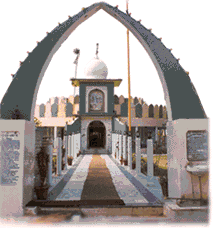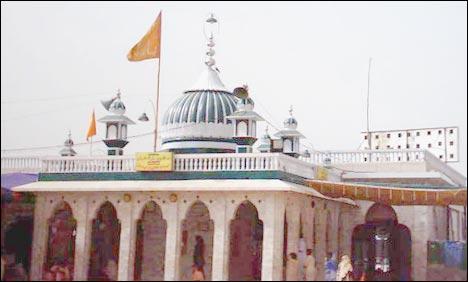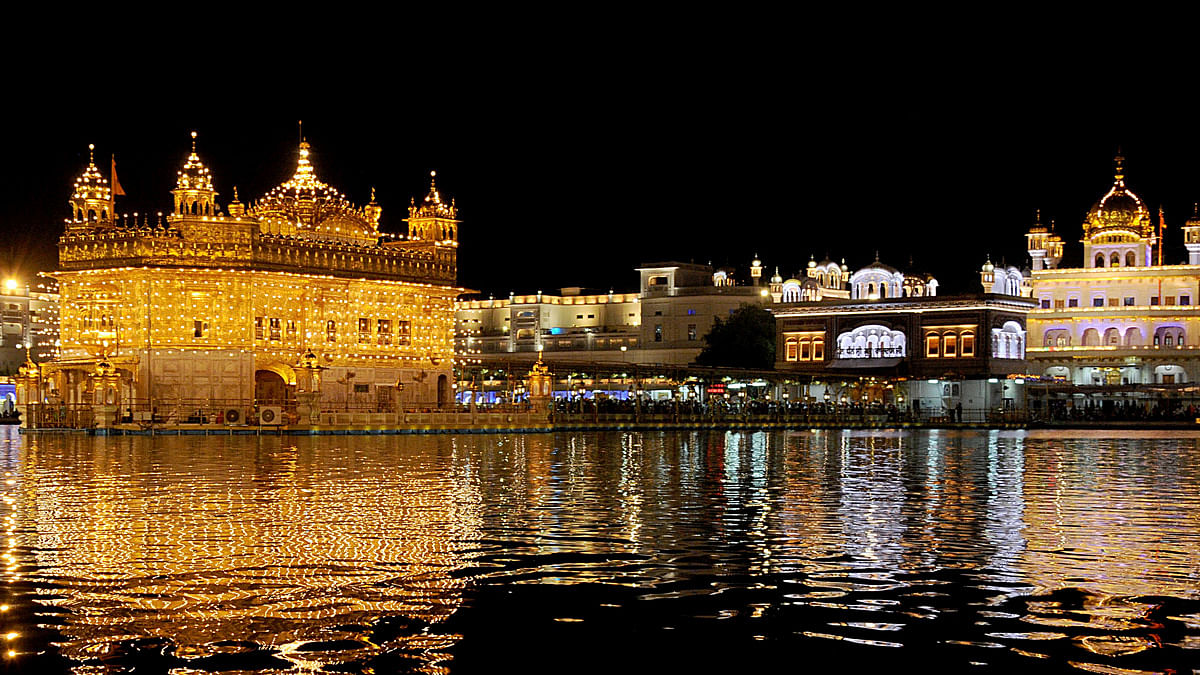
He is the first mystic poet who developed social relations with the non-muslim religious thinkers of the Sub-continent. As regards knowledge he is quoted to have said that one who leads the life of ignorance is like a dead corpse. He advised his students not to lower themselves in an attempt to secure high worldly positions. He used to preach that greatness and honour in fact correlate in doing justice. There is no substitute for time and religion in this world, and we should protect our faith with knowledge, was the teaching of Baba Farid. Baba Ji always emphasised the importance of time and religion in human life. He had the distinction of establishing an educational institution at Ajodhan, now Pakistan, where he trained a long chain of scholars like Hazrat Nizam– ud– Din Aulia, Ali Sabir of Kaliar Sharif and Syed Badar– ud– Din Ishaque who in turn furnished inspiration for creating an ideal realm of values. Once he was offered a pair of scissors which he returned with the remarks that his mission lies in joining and stitching and not tearing or cutting. He was the first poet of commitment in this region who struggled against poverty, misery, exploitation and the degradation of human beings.  Baba Farid’s place in the history of Chisti School of Islam and in the socio-political annals of Asia is unique. It made him a citizen of that universal society in which God is the Supreme Intelligence and all human beings, His manifestation. The mystic belief in God had a value in terms of human life. His life of 95 years is an illustration of the way in which a devotee struggles to shatter human limitations and liberates himself in order to live and lead his life for his Lord. Few saints in the long chequered history of Indo-Muslim mysticism have subjected their physical self to such rigorous spiritual disciple as Baba Farid. Baba Farid after completing his education joined Khawaja Bakhtiar Kaki as his disciple. It is also reported that Baba Farid received education in Qandhar. They were contemporaries of Sheikh Baha– ud– Din Zikriya. Then he joined the Madrassa of Maulana Minhaj– ud– Din where he met Khwaja Bakhtiar Kaki, the renowned disciple of Khawaja Syed Moin– ud– Din Chishty. Baba Farid’s first teacher, whose influence was most lasting, was his mother Qursum Bibi, a lady of fervent piety. His grandfather Qazi Shurib had migrated from Kabul during the early period of 12 th Century. Farid– ud– Din Masud, commonly known as Baba Farid Ganj Shakar was born in the twelfth Century AD at Khotwal near Multan. Name : Khwaja Fariduddin Masud Ganjshakarīorn on at Kothewal, Multan, Punjab, Ghurid Sultanate ĭied on at Pakpattan, Punjab, Delhi Sultanate Printer : Pakistan Security Printing Corporation Number of stamps in a s heet : 56 (fifty six) (8 x 7) Paper : 102 gum dual purpose coated PVA gum Issued for : To commemorate this august occasion Pakistan Post Office is issuing one commemorative postage stamp of Rs. Wikimedia Commons has media related to Shrine of Fariduddin Ganjshakar.A commemorative postage stamp on the 800 th Birth Anniversary of Sheikh Farid : Moral Conduct and Authority: The Place of Adab in South Asian Islam. ↑ Omer Tarin, 'Hazrat Baba Farid Ganj Shakar and the evolution of the literary Punjabi:A Brief Review' in Journal of Humanities and Liberal Arts, 1995, pp.21-30. State Formation and the Establishment of Non-Muslim Hegemony: Post-Mughal 19th-century Punjab.
Baba Farid’s place in the history of Chisti School of Islam and in the socio-political annals of Asia is unique. It made him a citizen of that universal society in which God is the Supreme Intelligence and all human beings, His manifestation. The mystic belief in God had a value in terms of human life. His life of 95 years is an illustration of the way in which a devotee struggles to shatter human limitations and liberates himself in order to live and lead his life for his Lord. Few saints in the long chequered history of Indo-Muslim mysticism have subjected their physical self to such rigorous spiritual disciple as Baba Farid. Baba Farid after completing his education joined Khawaja Bakhtiar Kaki as his disciple. It is also reported that Baba Farid received education in Qandhar. They were contemporaries of Sheikh Baha– ud– Din Zikriya. Then he joined the Madrassa of Maulana Minhaj– ud– Din where he met Khwaja Bakhtiar Kaki, the renowned disciple of Khawaja Syed Moin– ud– Din Chishty. Baba Farid’s first teacher, whose influence was most lasting, was his mother Qursum Bibi, a lady of fervent piety. His grandfather Qazi Shurib had migrated from Kabul during the early period of 12 th Century. Farid– ud– Din Masud, commonly known as Baba Farid Ganj Shakar was born in the twelfth Century AD at Khotwal near Multan. Name : Khwaja Fariduddin Masud Ganjshakarīorn on at Kothewal, Multan, Punjab, Ghurid Sultanate ĭied on at Pakpattan, Punjab, Delhi Sultanate Printer : Pakistan Security Printing Corporation Number of stamps in a s heet : 56 (fifty six) (8 x 7) Paper : 102 gum dual purpose coated PVA gum Issued for : To commemorate this august occasion Pakistan Post Office is issuing one commemorative postage stamp of Rs. Wikimedia Commons has media related to Shrine of Fariduddin Ganjshakar.A commemorative postage stamp on the 800 th Birth Anniversary of Sheikh Farid : Moral Conduct and Authority: The Place of Adab in South Asian Islam. ↑ Omer Tarin, 'Hazrat Baba Farid Ganj Shakar and the evolution of the literary Punjabi:A Brief Review' in Journal of Humanities and Liberal Arts, 1995, pp.21-30. State Formation and the Establishment of Non-Muslim Hegemony: Post-Mughal 19th-century Punjab. 
Religious Nationalism: Hindus and Muslims in India. Devotional Islam in Contemporary South Asia: Shrines, Journeys and Wanderers.
Baba farid sikhiwiki free#
The shrine maintains a langar, or canteen, which serves free meals to the poor. Baba Farid's shrine subsequently became a centre of wealth redistribution throughout the western Punjab. Gifts and donations to the shrine are redistributed to other devotees, in a practice that follows Baba Farid's example. The shrine is open 24 hours a day for visitors, every day of the year. The shrine is administered by the Auqaf Department.

The shrine and its wilayat also bound local tribes together with a collective identity based on reverence for the shrine. The secondary shrines form a wilayat, or a "spiritual territory" of the shrine, with Pakpattan serving as the capital of Baba Farid's spiritual territory, or wilayat. In keeping with Sufic tradition in Punjab, the shrine maintains influence over smaller shrines throughout the region around Pakpattan that are dedicated to specific events in Baba Farid's life.

The shrine was central to a process which resulted in the conversion of local Jat tribes to Islam over the course of several centuries. Built in the town that was known in medieval times as Ajodhan, the old town's importance was eclipsed by that of the shrine, as evidenced by its renaming to " Pakpattan," meaning "Pure Ferry" - referencing a river crossing made by pilgrims to the shrine.








 0 kommentar(er)
0 kommentar(er)
